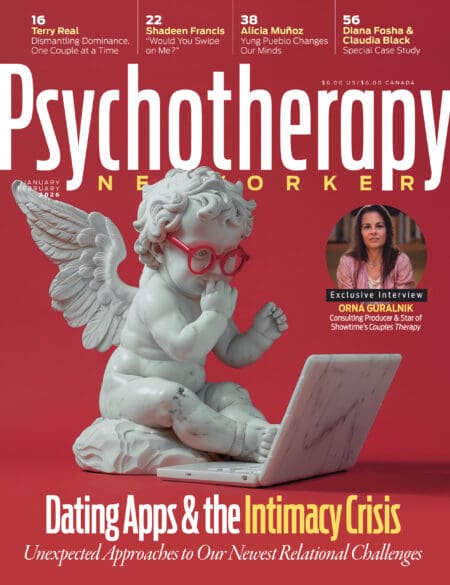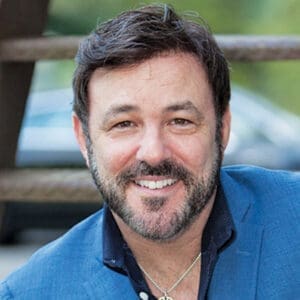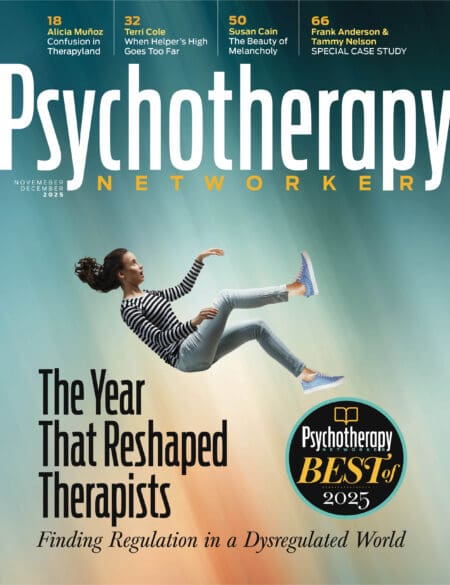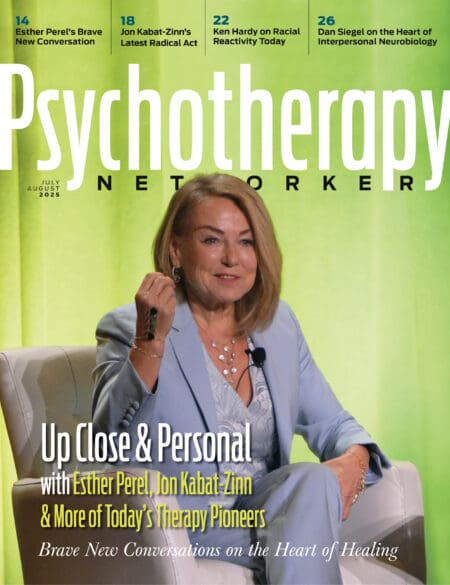Enjoy the audio preview version of this article—perfect for listening on the go.
There’s nothing quite like unwinding on a couch after a long day, for therapists and clients alike! But this engaging form of entertainment could actually be a form of healing. Readers loved our last piece on therapists’ favorite films so much that we asked four more therapists to share their favorite therapeutic movies—and here’s what we learned.
“Perfect Days”
Perfect Days, a Japanese film by German director Wim Wenders, opens at dawn with the simple morning ritual of Hirayama (Koji Yakusho) as he prepares to start his workday cleaning public toilets in Tokyo. He puts away his bedding, washes his face, brushes his teeth, gathers his keys and coins. He chooses a cassette to play in his van as he commutes, classic ’70s stuff carefully curated. He listens but does not sing along. Exciting? Nope. But this film is entrancing. Delicious.
When I first watched Perfect Days, I was curious how and why it pulled me in so deeply. It’s a beautiful movie, which was nominated for a 2023 Academy Award for Best International Feature Film, so I’m obviously not alone in my appreciation. But what’s going on here, and why do I want all my anxious teen and adult clients to see it? I think it started with the ease of quiet observation and the pull of Hirayama’s smile—and it expanded from there.
We first see this expression—a small smirk, really, that lives in Hirayama’s eyes—as he leaves his apartment and looks at the trees and early morning sky. We don’t hear his voice until 13 minutes in, when he has a brief conversation with a lost boy that he reunites with a frantic mother. As the boy turns and waves goodbye, we see Hirayama’s full-faced smile. From that moment on, I was hooked.
We don’t know much about Hirayama, at least not through anything he or other characters say. He moves through his routine with precision, and it’s clear he’s repeating a pattern: waking, commuting, working, bathing, eating, reading, sleeping. His young and talkative coworker finds him to be a mystery. “How can you put so much into a job like this?” he asks. “Not that I’m expecting an answer.”
It is, on the surface, about a job well done: taking pride in a task. But it’s also about connection: recognizing our impact on each other, moving through human “messes” with serenity. Hirayama doesn’t get pulled into the more urgent stories of those around him. He’s alone much of the time, but is he lonely? Research says that lonely people tend to be more self-focused and less responsive to others. That’s not what we see here.
So here’s an assignment I sometimes like to give an anxious client related to this film: First, watch the movie and notice the many types of connections that occur. Then, notice the flexibility the character exhibits, even within a quite ordinary routine. Anxiety, depression, and loneliness are internally focused states. They draw us inward. Anxiety can disguise itself as connection when it takes the form of hypervigilance, but even when anxiety thinks it’s observing the outside world, its goal is narrow: to selectively collect data for use by a catastrophic, anxious internal imagination.
By the end of the movie, we suspect that Hirayama’s solitary life is a choice, or at least a destination born of the complexities of family. How we fill in the pieces of his story—and where our own focus lands—is, I suppose, what makes this movie so useful therapeutically. What’s the story we project onto Hirayama? Do we value, crave (or feel anxious) in the quiet? The routine? The connections? The gratitude? The messes?
What is a perfect day? And how do we so often miss it?
Lynn Lyons, LICSW
“Sinners”
In his powerful film Sinners, director Ryan Coogler invites us into a haunting story I believe will enrich and enhance therapists’ perspective on individual and collective trauma. Sinners is far more than a historical drama-thriller. It’s a psychological excavation that unfolds deep within the psyche of its characters and invites viewers into a similar excavation. Through the eyes of Smoke and Stack, two Black WWI veterans hoping to open a juke joint at an old sawmill, we journey back to the Mississippi Delta, an American landscape steeped in memory, violence, and ancestral grief.
As a therapist who specializes in integrative work with unconscious patterning, I help clients uncover the deeper currents shaping their lives, including ancestral wounds, internalized narratives, and long-buried emotional material that may reveal, for instance, why someone sabotages intimate relationships or feels haunted by a grief they can’t name. The foundation of my work is in depth psychology, which invites us to explore the shadow, the parts of the psyche that remain hidden. In Sinners, that shadow isn’t just personal—it’s a cinematic descent into the American unconscious, where trauma, systemic oppression, and repressed history collide.
Jim Crow racism, postwar disillusionment, and generational pain rise to the surface in a story that mirrors the collective trauma of a country that’s never fully reckoned with its past. When Smoke and Stack return home as wounded warriors—both physically and psychologically—their shift from soldiers to bootleggers in the South represents more than moral ambiguity. It reveals the fragmentation of identity in the face of war and racial violence and quietly asks hard questions of its characters—and of us as viewers: Can we interrupt the cycle of silence and trauma passed down through generations, or are we destined to repeat it? What parts of our national identity have we denied? And what would it mean to face our collective shadow, not as an act of blame, but as a step toward healing?
In a time where racial trauma and historical amnesia continue to shape not just politics and our institutions but mental health, Sinners offers more than critique. It offers a mirror. For those of us working in the field of psychology, it reminds us that true transformation doesn’t come from turning away. It comes from turning inward and confronting what we’ve refused to see.
Krista Norris, LMFT
“Babygirl”
Babygirl, written, directed, and produced by Halina Reijn, is one of the most honest and realistic representations of the power of kinky/fetish eroticism that I’ve seen depicted in mainstream cinema. In it, Nicole Kidman plays Romy, a high-powered CEO who enters into a kinky relationship with her much younger intern, Samuel, played by Harris Dickinson. As a sex and relationship therapist who’s been practicing for 40 years, I can’t even begin to tell you how often I’ve worked with clients struggling with shame around kinky or fetishistic sexual desires, and how often I’ve run into denial and bias in other therapists when I tell them that kink and fetishism isn’t uncommon, pathological, or unhealthy.
Many therapists today recognize that powerful men often engage in degradation and submission rituals, in which they surrender power and allow themselves to be humiliated, whipped, collared, insulted, and made to perform degrading acts. I’ve heard this kink framed as the psyche’s need to find balance in lives that are otherwise weighted toward hyper-responsibility. That Babygirl gives the viewer the underappreciated feminine side of kink made me want to cheer. As a culture we’re sadly uneducated about the vast range of human eroticism across genders.
Far too often, therapists are held captive by their own bias and cultural preconceptions about what “sex” is. For them, the heteronormative standard is penetrative sex. Overtly or covertly, they try to change the erotic orientation of clients who come to them expressing a vastly different type of sexuality and fantasy life. Not only is this harmful, it’s a fool’s errand. For many, kink and fetishism isn’t just “sexual.” It is sex. Kinky, fetishistic fantasies aren’t going away, despite society’s or therapists’ well-intentioned efforts to tamp them down or make them more palatable by heteronormative standards. Try as those who prefer heteronormative sex may, they’ll never succeed at eliminating the sexual satisfaction derived by those who find dominance games, role-play, and even having a kinky affair (as in Romy’s case) with a younger subordinate to name a few.
In my work educating therapists about the role of kink and fetishism in sexuality, I’ve often found it helpful to highlight that virtually all sex is a form of theater. It plays out in the mind, not just in actions and behaviors. Again, in the case of kink/fetish, that theater is embraced as sex itself. It requires no penetration, only one’s erotic imagination. In Romy’s case, the sex is mental. It’s the fantasy and power exchange between her and Samuel that she finds erotic and fulfilling. After decades of hiding this “shameful” part of herself from her husband Jacob (played by Antonio Banderas), she also finds it deeply healing and empowering.
Validating someone’s erotic experience is the key to opening them to understanding their feelings, helping them deal with shame, and finding healthy ways to express
their eroticism. With clients, that may mean having discussions about opening their relationship, encouraging them to talk about it with their current partner, or even supporting them in their search for a partner who’ll help them discover the origins and potentially liberative power of their eroticism.
In Babygirl—as Romy embraces her true sexuality with Samuel—she awakens to a far more vibrant, animalistic part of herself—and ultimately becomes more whole and fulfilled. Given that those who stray into forbidden zones of erotic pleasure often meet a grim fate in mainstream movies (Faithful, Fatal Attraction, The Duke of Burgundy), this is truly a revolutionary take on what can happen when we honor and support our clients’ uniquely personal sexuality.
Joe Kort, PhD, LMSW
“Into the Wild”
As a complex trauma specialist, I work with many adults who have an avoidant attachment style due to early relationship wounds at the hands of unreliable, unavailable, or highly critical caregivers. As a result of these wounds, my clients often harbor elaborate fantasies about finding a way to escape the challenges and pain that accompany complicated, imperfect relationships with friends, family members, and romantic partners.
It makes sense that they want to “leave it all behind” and so often ask: What’s the point of trying to build or hold on to relationships if they only lead to disappointment and frustration?
For adults struggling with this question, I often recommend the movie Into the Wild. I saw this film 15 years ago, and it shifted my perspective on my own hardened individualism and how I related to others. Based on the book of the same title by author Jon Krakauer, it’s the true story of Christopher McCandless, a college graduate who stops communicating with his family, donates his money to an organization dedicated to alleviating global poverty, and divests himself of all material possessions other than a rifle, some rice, and a few books. Having dealt with major betrayals by his parents and harboring a deep belief that “people are bad to each other,” he’s eager to opt out of the post-college expectations people have placed on him and hit the open road in search of freedom, truth, and connection with nature.
Eventually, he makes his way to Alaska, where he’s determined to spend quality time by himself, completely off the grid. I won’t spoil the movie by telling you the end but suffice it to say that you should probably keep a box of tissues on hand. McCandless comes to an important realization, one that my clients with avoidant tendencies benefit from hearing: people need people. We’re an interdependent, albeit imperfect species. We’re all trying to figure this relationship thing out, and the right people—the trustworthy humans that add joy, value, and meaning to our lives—do exist. We just need to find them. 
Rachael Chatham, LCMHC
Lynn Lyons
Lynn Lyons, LICSW, is a speaker, trainer, and practicing clinician specializing in the treatment of anxious families. She’s the coauthor of Anxious Kids, Anxious Parents and is the cohost of the podcast Flusterclux. Her latest book for adults is The Anxiety Audit.
Krista Norris
Krista Norris, LMFT, has over 15 years of experience in the field of mental health. She’s an integrative therapist specializing in depth psychological approaches and is currently pursuing doctoral research at Pacifica Graduate Institute, where she explores trauma, cultural identity, and healing through symbolic and somatic lenses.
Joe Kort
Joe Kort, PhD, LMSW, is a board-certified sexologist and the founder of The Center for Relationship and Sexual Health, and runs a private practice in Royal Oak, Michigan. Dr. Kort, a therapist, coach and author, has been practicing psychotherapy for more than 38 years and has spoken internationally on the subject of gay counseling. He specializes in sex therapy, LGBTQ affirmative psychotherapy, sexually compulsive behaviors, and IMAGO relationship therapy designed for couples to enhance their relationship through improved communication. Dr. Kort is a blogger for the Huffington Post and Psychology Today on issues of sexuality. He has been a guest on the various television programs on mixed orientation marriages and “sexual addiction”. Dr. Kort is the author of several books, including, LGBTQ Clients in Therapy, 10 Smart Things Gay Men Can Do to Improve Their Lives, 10 Smart Things Gay Men Can Do to Find Real Love, and Is My Husband Gay, Straight or Bisexual.
Rachael Chatham
Rachael Chatham, LCMHC, specializes in working with adults navigating complex relational trauma. With certifications in Traumatic Stress, Buddhist Psychology, and Schema Therapy, she combines depth-oriented insight with practical tools to help clients deepen self-awareness, strengthen self-compassion, and build healthy communication skills. Contact: wholeselftherapy.com











